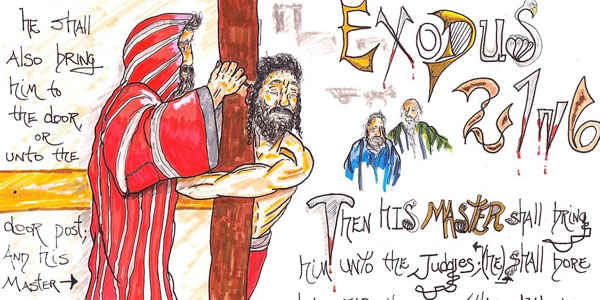Exodus 21:1-11 Click here for Bible Verses

Hi GAMErs!
Today’s passage is Exodus 21:1-11. Let’s go!
Exodus 21:1-11 (NIV)
1 “These are the laws you are to set before them:
2 “If you buy a Hebrew servant, he is to serve you for six years. But in the seventh year, he shall go free, without paying anything.
3 If he comes alone, he is to go free alone; but if he has a wife when he comes, she is to go with him.
4 If his master gives him a wife and she bears him sons or daughters, the woman and her children shall belong to her master, and only the man shall go free.
5 “But if the servant declares, ‘I love my master and my wife and children and do not want to go free,’
6 then his master must take him before the judges. He shall take him to the door or the doorpost and pierce his ear with an awl. Then he will be his servant for life.
7 “If a man sells his daughter as a servant, she is not to go free as menservants do.
8 If she does not please the master who has selected her for himself, he must let her be redeemed. He has no right to sell her to foreigners, because he has broken faith with her.
9 If he selects her for his son, he must grant her the rights of a daughter.
10 If he marries another woman, he must not deprive the first one of her food, clothing and marital rights.
11 If he does not provide her with these three things, she is to go free, without any payment of money.
On verses 1-11: In the Bible, 7 is a special number that often symbolizes that something is complete. We see many references to it in the Bible:
– God rested on the 7th day (Genesis 2:2-3)
– God commanded His people to rest from their work every 7th day (Exodus 20:9)
– God commanded His people to let even their fields rest from being used or plowed in the 7th year (Exodus 23:11, Leviticus 25:4).
Similarly, we see here in Exodus 21:1-11 that God institutes a system where after 6 years of service a servant working for an Israelite would be freed in the 7th year.
In our day whenever we think of servants or slaves, we might think of the barbaric practices of more recent Western slave trading, where people are kidnapped, treated inhumanely and forced to work as slaves for little or no compensation. We might also think about the cruel enslavement of the Israelites by the Egyptians earlier in Exodus. God wanted to make sure that this was not the Israelite system for slaves or servants, so in Exodus 21:1-11 God sets the foundation for a new system.
In Exodus, the system that God puts in place for Israelite slaves and servants was based on contract. A Hebrew worker would enter into a formal contract with his or her boss to work for them for a period of time, usually no more than 6 years, in exchange for compensation, food and lodging. In fact the word for “servant/slave” in Exodus 21 is also the word for “employee” and “worker”, and the laws we see in Exodus 21:1-11 were meant to apply to all those types of employment contracts.
These laws in Exodus 21:1-11 were put in place to protect the servants, especially female servants (v8-11), and to prevent abuse. Servants were to be freed from any contractual obligations to their boss in the seventh year.
Of course if the servant loved his or her boss’ family and wanted to continue the working relationship for life, there was provision for that too. It included a special legal ceremony where the employer would publicly (at the door of their home) pierce the employee’s ear (v5-6). The piercing was a visual, public reminder to all that this employee loved his master as well as his own wife and family. The piercing showed that the servant would rather keep serving his boss and be close to his own family than to go free.
When I think about this, I’m reminded of how Jesus Christ came as a humble servant and was publicly pierced for us. Jesus Christ served His Heavenly Father faithfully for many years on earth. If he wanted to, Jesus could have chosen to go free and not die on the cross the way He did (Matthew 26:53; John 10:18). But Jesus loved His master (His Heavenly Father), His bride (the church) and all her children, and did not want to be apart from them. So Jesus Christ allowed Himself to be pierced, so that we could be with Him forever.
Thus “he was pierced for our transgressions, he was crushed for our iniquities; the punishment that brought us peace was upon him, and by his wounds we are healed.” (Isaiah 53:5)
Lord Jesus, all praise and honour be to Your name for being our faithful servant king, the One who Himself to be pierced so that we could be with You always. In Jesus’ name, AMEN!

